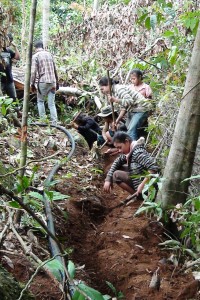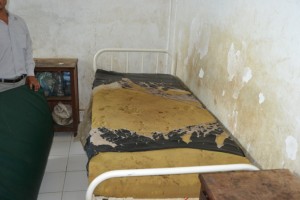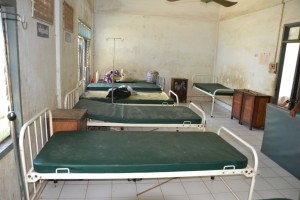Category Archives: News of projects
New of March-April, 2012
News January-February 2012
News (beginning of 2012) |
||
The Kapue Silk Project |
As part of its rural development work, the SFE used a theatre group from Vientiane for un unusual training project. Mid-December drama was used on several consecutive nights in the villages with which the SFE is working. That was a different way of demonstrating the main steps to the villagers should use when raising silkworms, winding good quality silk thread of and treating issues that can be encountered during production. This also reminds participants of this project’s main objectives which are that are acquisition of financial independence and the use of that to pay their children’s education of and facilitate easier access to health care. After each presentation the villagers were invited to come on stage and to answer questions about what they had seen and heard. Good participation with much laughter indicates that his approach is successful. | |
The <lang=”fr”>Attapeu nursing competition: 14th January |
The SFE provides training for the nurses in district hospitals (about twice to three times a month) and in the provincial hospital (once a week). A competition is held annually to encourage and motivate nurses. SFE staff select those who should be rewarded and also asses the effectiveness of the training session. This is always a happy occasion and gifts, such as a nice SFE shirt for example, are distributed. Singing and a delicious meal create a pleasant atmosphere and the day terminates with the presentation of the long awaited diplomas. | |
Sekong: TB project |
From 13th to 24th February French doctors came to help SFE for medical staff training in the Sekong hospital. This voluntary help, started in 1999 is always appreciated. This year, two dentists, an optician and a radiologist shared their knowledge with their counterparts in Laos. Many patients in the region benefited from medical and optical treatment. 420 patients were examined in eye clinics and about 45 kg of glasses from France were distributed free of charge. | |
Kapue Silk Project : a participant testifies |
Témoignage d’une villageoise qui produit de la soie (source : blog d’Elise et Célio Nelson)Five years ago SFE started a project to develop silk production in the Sekong province. There is a significant market for silk in Laos and neighboring countries. The project’s aim is to enable villagers to earn extra income and thereby improve their living conditions. E. was only seven 7 years old when she terminated school. She would have liked to continue school but her family needed her for work. She was married when she was 17 and today at 22 she is the mother of a baby four months. She has been trained by SFE and is now integrated in the project. « At first we did not want to raise silkworms because we were afraid of them! But on seeing that other villagers could earn additional income by producing silk, my parents encouraged me to participate. I find it is easier for raise silkworms rather than buffaloes! ” She has now been producing silk for four years silk. Silk production can increase family income by up to 40 euros per month (In Laos, the average monthly wage is less than 30 euros per month). In addition to silk production the faeces of silkworm droppings are used for making tea! There is also a lucrative market for the caterpillars as these are delicious grilled! While the income from rice production is irregular and depends on the weather particularly during the harvesting time silk production assures a regular monthly income. Through this regular income E’s entire family benefits. Her family consists of seven people : her mother and father, two brothers, her husband, her baby and herself. Their living conditions have considerably improved. “With this additional income we can purchase more: meat, clothes … But I have not yet been able to afford a television! ” E. is one of the best in the village for silk production and has acquired autonomy by the means of this activity. She has learned how to reproduce silkworms and by so doing avoids the cost of buying them. On the other hand she does not maintain a plantation of mulberry trees and is therefore obligated to buy the mulberry leaves to feed her caterpillars. She still hopes to find extra time to do that and thereby further reduce costs. She has become independent and wishes to continue producing silk. She would like to return to school but does not think this will be possible. The entire family now depends on her. “Life was hard before I had the opportunity of participating in the silk project. If I was not producing silk I would be growing vegetables but income from that is lower. I hope to continue producing silk » |
|
| HAUT DE LA PAGE | ||
News 2011
News 2011 |
|||
Attapeu |
AttapeuSaydonkhong”>Community Development Project
 Discover road conditions at the beginning of the rainy season in this video clip (8 ‘) Discover road conditions at the beginning of the rainy season in this video clip (8 ‘)Construction of the Saydonkhong health centre: Video clip (4’40 “) |
||
Sekong |
Tuberculosis ProjectFollowing the success in the <lang=”fr”>Attapeu province the proposed fight against tuberculosis has been “exported” to the neighboring province at the request of the provincial hospital in the Sekong province. So on April 28, after two years of preparation, the Memorandum of Understanding (MOU) for the first phase of the project was finally signed, for a period of three years. HAUT DE LA PAGE |
||
Personnel |
ArrivalsOn July 19 Elise Nelson and Celiowith their children joined the SFE. They are studying Lao in Vientiane until early November, before joining Nathaniel Rediger on the Kapu Rural Development Project. ReturnsOn July 8, the Lebreuil family returned to Switzerland after two years working in the SFE headquarters in Vientiane. The SFE is considering the future of the rural development project (now mainly focused on sericulture) and how it can be diversified. In this context, Sophie Hege, an agricultural student came ina and provided valuable assistance in serving a six months period on the Kapeu farm. |
||








